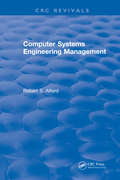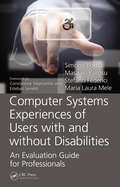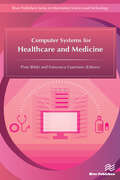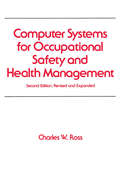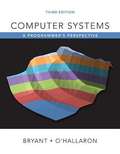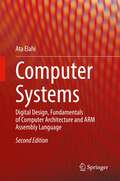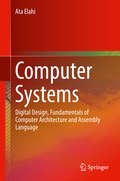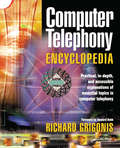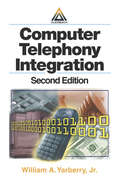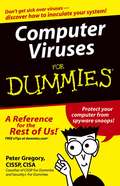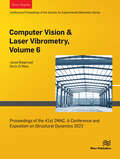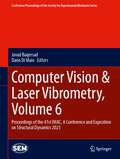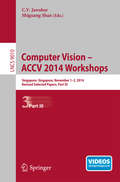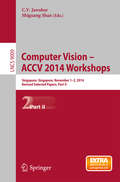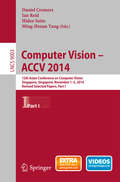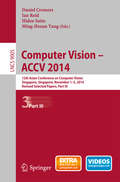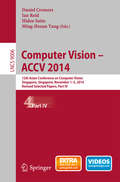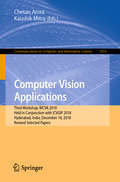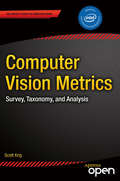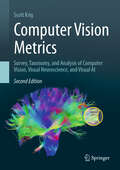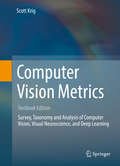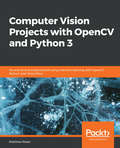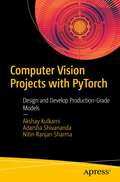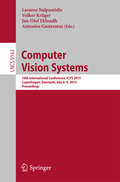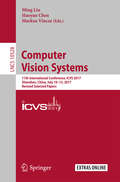- Table View
- List View
Computer Systems Engineering Management: Electrical Engineering And Electronics, 45
by Robert S. AlfordComputer Systems Engineering Management provides a superb guide to the overall effort of computer systemsbridge building. It explains what to do before you get to the river, how to organise your work force, how to manage the construction, and what do when you finally reach the opposite shore. It delineates practical approaches to real-world development issues and problems presents many examples and case histories and explains techniques that apply to everything from microprocessors to mainframes and from person computer applications to extremely sophisticated systems
Computer Systems Experiences of Users with and Without Disabilities: An Evaluation Guide for Professionals (Rehabilitation Science in Practice Series)
by Masaaki Kurosu Stefano Federici Simone Borsci Maria Laura MeleThis book provides to manufacturers, designers and evaluation professionals the necessary tools for balancing design and the assessment phases during the product lifecycle. It proposes an integrated model of interaction evaluation for a holistic analysis of the user experience by both discussing in details the interaction testing methods, and promoting the involvement of disabled users in human computer interaction evaluation.
Computer Systems for Healthcare and Medicine (River Publishers Series In Information Science And Technology Ser.)
by Francesca Guerriero Piotr BilskiThe development of modern civilization leads to us having to solve new problems which did not exist before. The contemporary world faces a great challenge of aging societies, where the increasing number of citizens requires constant medical attention. To ensure safety and wellbeing of elderly people, patients in hospitals and disabled persons, advanced technologies can be implemented. These include both sophisticated data acquisition systems and data processing algorithms, aiming at the constant and discreet monitoring of persons whilst raising alarm if immediate attention is required.Computer Systems for Healthcare and Medicine presents a novel look at the introduced problems, including proposed solutions in the form of automated data acquisition and processing systems, which were tested in various environments. Characteristic features include a wide range of sensors used to monitor the situation of the person, and accurate decision making algorithms, often based on the computational intelligence domain. Technical topics discussed in the book include application for the healthcare of the following:Infrared sensorsMEMSUltra wideband radarsDeep learningDecision treesArtificial neural networksGabor filtersDecision support systems
Computer Systems for Occupational Safety and Health Management
by Charles W. RossThis book describes how safety and other professionals may use safety database software on a personal computer to manage their safety and health programs. It emphasizes the techniques and features necessary to develop a computerized safety data system for a personal computer.
Computer Systems: A Programmer's Perspective, Third Edition
by Randal E. Bryant David R. O'HallaronThis book (known as CS: APP) is for computer scientists, computer engineers, and others who want to be able to write better programs by learning what is going on "under the hood" of a computer system.
Computer Systems: Digital Design, Fundamentals of Computer Architecture and ARM Assembly Language
by Ata ElahiThis updated textbook covers digital design, fundamentals of computer architecture, and ARM assembly language. The book starts by introducing computer abstraction, basic number systems, character coding, basic knowledge in digital design, and components of a computer. The book goes on to discuss information representation in computing, Boolean algebra and logic gates, and sequential logic. The book also presents introduction to computer architecture, Cache mapping methods, and virtual memory. The author also covers ARM architecture, ARM instructions, ARM assembly language using Keil development tools, and bitwise control structure using C and ARM assembly language. The book includes a set of laboratory experiments related to digital design using Logisim software and ARM assembly language programming using Keil development tools. In addition, each chapter features objectives, summaries, key terms, review questions, and problems.
Computer Systems: Digital Design, Fundamentals of Computer Architecture and Assembly Language
by Ata ElahiThis textbook covers digital design, fundamentals of computer architecture, and assembly language. The book starts by covering basic number systems and character coding, basic knowledge in digital design, and components of a computer. It goes on to cover topics such as information representation in computing; Boolean algebra and logic gates; sequential logic; input/output; and CPU performance. The author also covers ARM architecture, ARM instructions and ARM assembly language which is used in a variety of devices such as cell phones, digital TV, automobiles, routers, and switches. The book contains a set of laboratory experiments related to digital design using Logisim software; in addition, each chapter features objectives, summaries, key terms, review questions and problems. The book is targeted to students majoring Computer Science, Information System and IT and follows the ACM/IEEE 2013 guidelines. * Comprehensive textbook covering digital design, computer architecture, and ARM architecture and assembly * Covers basic number system and coding, basic knowledge in digital design, and components of a computer * Features laboratory exercises in addition to objectives, summaries, key terms, review questions, and problems in each chapter
Computer Telephony Encyclopedia
by Richard GrigonisIf you want to grasp the full length and breadth of the rapidly developing computer telephony field, this book is the place to start. Author Richard Grigonis thoroughly explains even the most abstruse ideas in a concise manner that is aimed at all kinds of readers -- students, business executives, telecom managers, call center supervisors or entrep
Computer Telephony Integration
by William A. Yarberry Jr.Since the publication of the first edition, the CTI world has changed significantly. Where it was once focused on the integration of voice systems with computers, the focus is now on IP-based voice, or converged networks and services. Today, the telcos are upgrading their systems from circuit-switched to IP-based packet-switched networks. Companies
Computer Viruses For Dummies
by Peter H. GregoryComputer viruses--just the thought of your trusty PC catching one is probably enough to make you sick. Thanks to the cyber-sickies who persist in coming up with new strains, there's a major new cyberattack nearly every day. Viruses sneak in, usually through e-mail.Fortunately, there are ways to inoculate and protect your computer. Computer Viruses For Dummies helps you:Understand the risks and analyze your PC's current conditionSelect, install, and configure antivirus softwareScan your computer and e-mailRid your computer of viruses it's already caughtUpdate antivirus software and install security patchesUse firewalls and spyware blockersProtect handheld PDAs from virusesAdopt safe computing practices, especially with e-mail and when you're surfing the NetWritten by Peter H. Gregory, coauthor of CISSP For Dummies and Security + For Dummies, Computer Viruses For Dummies goes beyond viruses to explain other nasty computer infections like Trojan horses, HiJackers, worms, phishing scams, spyware, and hoaxes. It also profiles major antivirus software to help you choose the best program(s) for your needs.Remember, if you don't protect your computer, not only do you risk having your computer infiltrated and your data contaminated, you risk unknowingly transmitting a virus, worm, or other foul computer germ to everybody in your address book! This guide will help you properly immunize your PC with antivirus software now and install updates and security patches that are like booster shots to keep your software protected against new viruses.
Computer Vision & Laser Vibrometry, Volume 6: Proceedings of the 41st IMAC, A Conference and Exposition on Structural Dynamics 2023
by Dario Di Maio Javad BaqersadComputer Vision & Laser Vibrometry, Volume 6: Proceedings of the 41st IMAC, A Conference and Exposition on Structural Dynamics, 2023, the sixth volume of ten from the Conference brings together contributions to this important area of research and engineering. The collection presents early findings and case studies on fundamental and applied aspects of Computer Vision, Laser Vibrometry and Structural Health Monitoring, including papers on: Novel Techniques Optical Methods, Scanning LDV Methods Photogrammetry & DIC Structural Health Monitoring.
Computer Vision & Laser Vibrometry, Volume 6: Proceedings of the 41st IMAC, A Conference and Exposition on Structural Dynamics 2023 (Conference Proceedings of the Society for Experimental Mechanics Series)
by Dario Di Maio Javad BaqersadComputer Vision & Laser Vibrometry, Volume 6: Proceedings of the 41st IMAC, A Conference and Exposition on Structural Dynamics, 2023, the sixth volume of ten from the Conference brings together contributions to this important area of research and engineering. The collection presents early findings and case studies on fundamental and applied aspects of Computer Vision, Laser Vibrometry and Structural Health Monitoring, including papers on:Novel TechniquesOptical Methods,Scanning LDV MethodsPhotogrammetry & DICStructural Health Monitoring
Computer Vision - ACCV 2014 Workshops, Part III: Singapore, Singapore, November 1-2, 2014, Revised Selected Papers, Part III (Lecture Notes in Computer Science #9010)
by C. V. Jawahar Shiguang ShanThe three-volume set, consisting of LNCS 9008, 9009, and 9010, contains carefully reviewed and selected papers presented at 15 workshops held in conjunction with the 12th Asian Conference on Computer Vision, ACCV 2014, in Singapore, in November 2014. The 153 full papers presented were selected from numerous submissions. LNCS 9008 contains the papers selected for the Workshop on Human Gait and Action Analysis in the Wild, the Second International Workshop on Big Data in 3D Computer Vision, the Workshop on Deep Learning on Visual Data, the Workshop on Scene Understanding for Autonomous Systems and the Workshop on Robust Local Descriptors for Computer Vision. LNCS 9009 contains the papers selected for the Workshop on Emerging Topics on Image Restoration and Enhancement, the First International Workshop on Robust Reading, the Second Workshop on User-Centred Computer Vision, the International Workshop on Video Segmentation in Computer Vision, the Workshop: My Car Has Eyes: Intelligent Vehicle with Vision Technology, the Third Workshop on E-Heritage and the Workshop on Computer Vision for Affective Computing. LNCS 9010 contains the papers selected for the Workshop on Feature and Similarity for Computer Vision, the Third International Workshop on Intelligent Mobile and Egocentric Vision and the Workshop on Human Identification for Surveillance.
Computer Vision - ACCV 2014 Workshops: Singapore, Singapore, November 1-2, 2014, Revised Selected Papers, Part II (Lecture Notes in Computer Science #9009)
by C. V. Jawahar Shiguang ShanThe three-volume set, consisting of LNCS 9008, 9009, and 9010, contains carefully reviewed and selected papers presented at 15 workshops held in conjunction with the 12th Asian Conference on Computer Vision, ACCV 2014, in Singapore, in November 2014. The 153 full papers presented were selected from numerous submissions. LNCS 9008 contains the papers selected for the Workshop on Human Gait and Action Analysis in the Wild, the Second International Workshop on Big Data in 3D Computer Vision, the Workshop on Deep Learning on Visual Data, the Workshop on Scene Understanding for Autonomous Systems, and the Workshop on Robust Local Descriptors for Computer Vision. LNCS 9009 contains the papers selected for the Workshop on Emerging Topics on Image Restoration and Enhancement, the First International Workshop on Robust Reading, the Second Workshop on User-Centred Computer Vision, the International Workshop on Video Segmentation in Computer Vision, the Workshop: My Car Has Eyes: Intelligent Vehicle with Vision Technology, the Third Workshop on E-Heritage, and the Workshop on Computer Vision for Affective Computing. LNCS 9010 contains the papers selected for the Workshop on Feature and Similarity for Computer Vision, the Third International Workshop on Intelligent Mobile and Egocentric Vision, and the Workshop on Human Identification for Surveillance.
Computer Vision -- ACCV 2014: 12th Asian Conference on Computer Vision, Singapore, Singapore, November 1-5, 2014, Revised Selected Papers, Part I (Lecture Notes in Computer Science #9003)
by Daniel Cremers Ian Reid Hideo Saito Ming-Hsuan YangThe five-volume set LNCS 9003--9007 constitutes the thoroughly refereed post-conference proceedings of the 12th Asian Conference on Computer Vision, ACCV 2014, held in Singapore, Singapore, in November 2014. The total of 227 contributions presented in these volumes was carefully reviewed and selected from 814 submissions. The papers are organized in topical sections on recognition; 3D vision; low-level vision and features; segmentation; face and gesture, tracking; stereo, physics, video and events; and poster sessions 1-3.
Computer Vision -- ACCV 2014: 12th Asian Conference on Computer Vision, Singapore, Singapore, November 1-5, 2014, Revised Selected Papers, Part III (Lecture Notes in Computer Science #9005)
by Daniel Cremers Ian Reid Hideo Saito Ming-Hsuan YangThe five-volume set LNCS 9003--9007 constitutes the thoroughly refereed post-conference proceedings of the 12th Asian Conference on Computer Vision, ACCV 2014, held in Singapore, Singapore, in November 2014. The total of 227 contributions presented in these volumes was carefully reviewed and selected from 814 submissions. The papers are organized in topical sections on recognition; 3D vision; low-level vision and features; segmentation; face and gesture, tracking; stereo, physics, video and events; and poster sessions 1-3.
Computer Vision -- ACCV 2014: 12th Asian Conference on Computer Vision, Singapore, Singapore, November 1-5, 2014, Revised Selected Papers, Part IV (Lecture Notes in Computer Science #9006)
by Daniel Cremers Ian Reid Hideo Saito Ming-Hsuan YangThe five-volume set LNCS 9003--9007 constitutes the thoroughly refereed post-conference proceedings of the 12th Asian Conference on Computer Vision, ACCV 2014, held in Singapore, Singapore, in November 2014. The total of 227 contributions presented in these volumes was carefully reviewed and selected from 814 submissions. The papers are organized in topical sections on recognition; 3D vision; low-level vision and features; segmentation; face and gesture, tracking; stereo, physics, video and events; and poster sessions 1-3.
Computer Vision Applications: Third Workshop, WCVA 2018, Held in Conjunction with ICVGIP 2018, Hyderabad, India, December 18, 2018, Revised Selected Papers (Communications in Computer and Information Science #1019)
by Chetan Arora Kaushik MitraThis book constitutes the refereed proceedings of the third Workshop on Computer Vision Applications, WCVA 2018, held in Conjunction with ICVGIP 2018, in Hyderabad, India, in December 2018. The 10 revised full papers presented were carefully reviewed and selected from 32 submissions. The papers focus on computer vision; industrial applications; medical applications; and social applications.
Computer Vision Metrics: Survey, Taxonomy, and Analysis
by Scott KrigBased on the successful 2014 book published by Apress, this textbook edition is expanded to provide a comprehensive history and state-of-the-art survey for fundamental computer vision methods. With over 800 essential references, as well as chapter-by-chapter learning assignments, both students and researchers can dig deeper into core computer vision topics. The survey covers everything from feature descriptors, regional and global feature metrics, feature learning architectures, deep learning, neuroscience of vision, neural networks, and detailed example architectures to illustrate computer vision hardware and software optimization methods. To complement the survey, the textbook includes useful analyses which provide insight into the goals of various methods, why they work, and how they may be optimized. The text delivers an essential survey and a valuable taxonomy, thus providing a key learning tool for students, researchers and engineers, to supplement the many effective hands-on resources and open source projects, such as OpenCVand other imaging and deep learning tools.
Computer Vision Metrics: Survey, Taxonomy, and Analysis of Computer Vision, Visual Neuroscience, and Visual AI
by Scott KrigThis 2nd Edition, based on the successful 2016 textbook, has been updated and expanded to cover 3rd generation Computer Vision and AI as it supersedes historical visual computing methods, providing a comprehensive survey of essential topics and methods in Computer Vision. With over 1,200 essential references, as well as chapter-by-chapter learning assignments, the book offers a valuable resource for students, researchers, scientists and engineers, helping them dig deeper into core computer vision and foundational visual computing and neuroscience topics. As before, a historical survey of advances in Computer Vision is provided, updated to reflect the latest methods such as Vision Transformers, attention models, alternative features such as Fourier neurons and Binary neurons, hybrid DNN architectures, self-supervised and enhanced learning models, Associative Multimodal Learning, Continuous Learning, View Synthesis, intelligent Scientific Imaging, andadvances in training protocols. Updates have also been added for 2d/3d cameras, software libraries and open source resources, computer vision cloud services, and vision/AI hardware accelerators. Discussion and analysis are provided to uncover intuition and delve into the essence of key advancements, applied and forward-looking topics.
Computer Vision Metrics: Textbook Edition
by Scott KrigBased on the successful 2014 book published by Apress, this textbook edition is expanded to provide a comprehensive history and state-of-the-art survey for fundamental computer vision methods. With over 800 essential references, as well as chapter-by-chapter learning assignments, both students and researchers can dig deeper into core computer vision topics. The survey covers everything from feature descriptors, regional and global feature metrics, feature learning architectures, deep learning, neuroscience of vision, neural networks, and detailed example architectures to illustrate computer vision hardware and software optimization methods. To complement the survey, the textbook includes useful analyses which provide insight into the goals of various methods, why they work, and how they may be optimized. The text delivers an essential survey and a valuable taxonomy, thus providing a key learning tool for students, researchers and engineers, to supplement the many effective hands-on resources and open source projects, such as OpenCVand other imaging and deep learning tools.
Computer Vision Projects with OpenCV and Python 3: Six end-to-end projects built using machine learning with OpenCV, Python, and TensorFlow
by Matthew ReverGain a working knowledge of advanced machine learning and explore Python's powerful tools for extracting data from images and videos Key Features Implement image classification and object detection using machine learning and deep learning Perform image classification, object detection, image segmentation, and other Computer Vision tasks Crisp content with a practical approach to solving real-world problems in Computer Vision Book Description Python is the ideal programming language for rapidly prototyping and developing production-grade codes for image processing and Computer Vision with its robust syntax and wealth of powerful libraries. This book will help you design and develop production-grade Computer Vision projects tackling real-world problems. With the help of this book, you will learn how to set up Anaconda and Python for the major OSes with cutting-edge third-party libraries for Computer Vision. You'll learn state-of-the-art techniques for classifying images, finding and identifying human postures, and detecting faces within videos. You will use powerful machine learning tools such as OpenCV, Dlib, and TensorFlow to build exciting projects such as classifying handwritten digits, detecting facial features,and much more. The book also covers some advanced projects, such as reading text from license plates from real-world images using Google's Tesseract software, and tracking human body poses using DeeperCut within TensorFlow. By the end of this book, you will have the expertise required to build your own Computer Vision projects using Python and its associated libraries. What you will learn Install and run major Computer Vision packages within Python Apply powerful support vector machines for simple digit classification Understand deep learning with TensorFlow Build a deep learning classifier for general images Use LSTMs for automated image captioning Read text from real-world images Extract human pose data from images Who this book is for Python programmers and machine learning developers who wish to build exciting Computer Vision projects using the power of machine learning and OpenCV will find this book useful. The only prerequisite for this book is that you should have a sound knowledge of Python programming.
Computer Vision Projects with PyTorch: Design and Develop Production-Grade Models
by Akshay Kulkarni Adarsha Shivananda Nitin Ranjan SharmaDesign and develop end-to-end, production-grade computer vision projects for real-world industry problems. This book discusses computer vision algorithms and their applications using PyTorch.The book begins with the fundamentals of computer vision: convolutional neural nets, RESNET, YOLO, data augmentation, and other regularization techniques used in the industry. And then it gives you a quick overview of the PyTorch libraries used in the book. After that, it takes you through the implementation of image classification problems, object detection techniques, and transfer learning while training and running inference. The book covers image segmentation and an anomaly detection model. And it discusses the fundamentals of video processing for computer vision tasks putting images into videos. The book concludes with an explanation of the complete model building process for deep learning frameworks using optimized techniques with highlights on model AI explainability.After reading this book, you will be able to build your own computer vision projects using transfer learning and PyTorch.What You Will LearnSolve problems in computer vision with PyTorch.Implement transfer learning and perform image classification, object detection, image segmentation, and other computer vision applicationsDesign and develop production-grade computer vision projects for real-world industry problemsInterpret computer vision models and solve business problemsWho This Book Is ForData scientists and machine learning engineers interested in building computer vision projects and solving business problems
Computer Vision Systems: 10th International Conference, ICVS 2015, Copenhagen, Denmark, July 6-9, 2015, Proceedings (Lecture Notes in Computer Science #9163)
by Volker Krüger Lazaros Nalpantidis Jan-Olof Eklundh Antonios GasteratosThis book constitutes the refereed proceedings of the 10th International Conference on Computer Vision Systems, ICVS 2015, held in Copenhagen, Denmark, in July 2015. The 48 papers presented were carefully reviewed and selected from 92 submissions. The paper are organized in topical sections on biological and cognitive vision; hardware-implemented and real-time vision systems; high-level vision; learning and adaptation; robot vision; and vision systems applications.
Computer Vision Systems: 11th International Conference, ICVS 2017, Shenzhen, China, July 10-13, 2017, Revised Selected Papers (Lecture Notes in Computer Science #10528)
by Ming Liu Haoyao Chen Markus VinczeIn the past few years, with the advances in microelectronics and digital te- nology, cameras became a widespread media. This, along with the enduring increase in computing power boosted the development of computer vision s- tems. The International Conference on Computer Vision Systems (ICVS) covers the advances in this area. This is to say that ICVS is not and should not be yet another computer vision conference. The ?eld of computer vision is fully covered by many well-established and famous conferences and ICVS di?ers from these by covering the systems point of view. ICVS 2008 was the 6th International Conference dedicated to advanced research on computer vision systems. The conference, continuing a series of successful events in Las Palmas, Vancouver, Graz, New York and Bielefeld, in 2008 was held on Santorini. In all, 128 papers entered the review process and each was reviewed by three independent reviewers using the double-blind review method. Of these, 53 - pers were accepted (23 as oral and 30 as poster presentation). There were also two invited talks by P. Anandan and by Heinrich H. Bultho ¨ ?. The presented papers cover all aspects of computer vision systems, namely: cognitive vision, monitor and surveillance, computer vision architectures, calibration and reg- tration, object recognition and tracking, learning, human--machine interaction and cross-modal systems.
